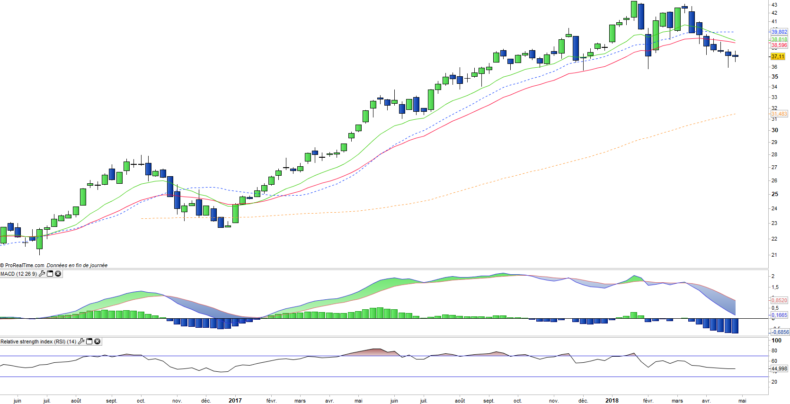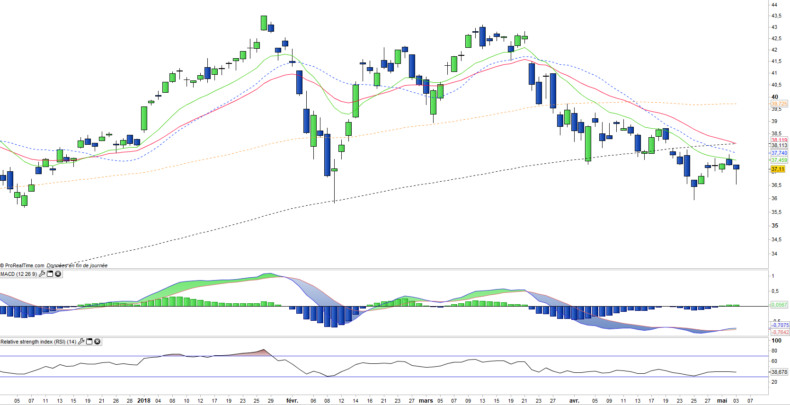Emerging Markets internet and e-commerce (EMQQ) - 04/05/2018
Short Term strategy: Negative (30%) / Trend =
Long Term startegy: Positive (65%) / Trend =
Characteristics of the ETF
The ETF EMQQ (ETC) replicates a market capitalization-weighted index of companies operating Internet-related businesses in emerging and frontier markets. EMQQ is a specialized fund comprised of emerging market Internet and technology stocks, exclusively listed in the United States. These companies are generally specialized in online sales, e-commerce and gaming. Unsurprisingly, Chinese companies represent a significant part of EMQQ's weighting. The fund is weighted according to market capitalization, but with a limit of 8% for each security at the time of the reconstitution of the list in June and December, and is quite concentrated on the ten most important securities, in particular Tencent, Alibaba and Baidu.
Fees are 0.86% and AUM are $ 516M. Replication is direct and there is a dividend policy on an annual basis.
Alternative ETFs: N / A
Index & components
EMQQ gives access to 47 specialized Internet and e-commerce securities, which originate from China for c.63%, South Korea for 10%, Russia for c.6% and South Africa for c.6% but which also include companies from India, South America, the Middle East and Eastern Europe.
The top 10 companies account for nearly 60% of the market capitalization of the index, which includes the 3 heavyweights Alibaba, Tencent and Baidu whose market capitalization is just like the GAFAs of several hundred billion dollars. Companies selected in EMQQ are required to engage in e-commerce or Internet activities and include search engines, online retail, social media, online video, electronic payments, online gaming, and online travel activities.
In 2025, the consumer society will reach 4.2 billion people against 2.4 billion in 2010 and 1.2 billion in 1990. Consumption in emerging countries will then represent 30 trillion dollars - almost half of the total world consumption. The transformation of purchasing behavior through the use of the Internet is deeply felt in emerging markets, whose embryonic middle classes are developing rapidly. The falling costs of smartphones and bandwidth allow for increasing internet access in developing countries, both in rural and urban areas.
Today, there are about 2 billion smartphone users worldwide. By 2020, this number is expected to double to over 4 billion, which will transform purchasing behavior, which should in the first place allow e-commerce to benefit from growth in emerging markets consumption. Due to a relatively undeveloped retail sector in emerging markets, it is easy to imagine that online sales could represent a larger proportion of retail sales in emerging markets than in developed economies. The vast majority of emerging market consumers do not own cars or computers, do not shop in supermarkets, and do not have an internet connection. E-commerce companies therefore allow emerging-market consumers to "jump" a step, switching directly to next generation consumption from a smartphone.
Latest developments
EMQQ recorded an increase of + 66% in 2017, but consolidated by around 2% since the beginning of 2018 in the wake of Tencent which consolidates by 5%.
This consolidation took place against a backdrop of consolidation of US technology stocks (Facebook in particular) and increasing trade tensions between China and the US while EMQQ is essentially a bet on the Chinese consumer, which also implies a high exposure to China's economic cycle.
Tencent, Alibaba and Baidu have become companies that compete with the GAFAs but other giants could also emerge in other parts of the world. It is therefore a double challenge, both on a heavy technological trend but also on the development of the economy of emerging countries and its consumers. Wechat messaging now has 1 billion active users and Tencent has made instant messaging, installed on just about every mobile phone in China, a platform for entertainment and games stimulating all of its activities. The residual potential of this industry in emerging countries seems considerable.
Weekly data
The weekly chart highlights a bearish break-out of the bullish trend line that has been active since the beginning of 2017, which has triggered a correction. The weekly EMA13 and 26 are down and threaten to cross in the absence of a bullish reaction. The EMA100 located near the $ 33 zone could be a natural target for further correction.
Daily data
On the daily chart, we see that the short-term correction is about to go one step further with the bearish break-out of the daily EMA200 - to be confirmed - which would give a bearish signal in the medium term horizon. For the moment prices remain very close to the EMA200, which makes the technical situation uncertain in the short term.
ETF Objective
Characteristics
| Inception date | 12/11/2014 |
| Expense ratio | 0,86% |
| Issuer | ETC |
| Benchmark |
NYSE Arca
|
| Code/Ticker | EMQQ |
| ISIN | US3015058890 |
| UCITS | No |
| Currency | Dollar |
| Exchange | NYSE |
| Assets Under Management | 516 M$ |
| Currency Risk | Yes |
| Number of Holdings | 43 |
| Risk | 4/5 |
Country Breakdown
| China | 62% |
| South Korea | 11% |
| Russia | 7% |
| South Africa | 6% |
| Argentina | 6% |
| Others | 8% |
Sector Breakdown
| Information Technology | 79% |
| Consumer discretionary | 12% |
| Industrials | 1% |
Top Ten Holdings
| Tencent Holdings | 8% |
| Alibaba Group | 7% |
| Naspers Ltd | 6% |
| Baidu Inc | 6% |
| JD.com | 6% |
| Mercadolibre | 5% |
| Yandex | 5% |
| Netease | 5% |
| Naver Corp | 5% |
| Ctrip.com Intl | 4% |
[/groups_member]


